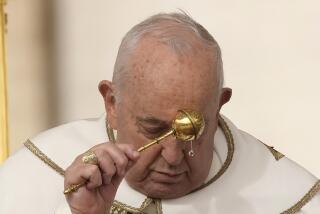PASSINGS: Jozef Glemp, Steven Muller
Jozef Glemp
Polish cardinal
Cardinal Jozef Glemp, 83, the head of Poland’s influential Roman Catholic church from 1981 to 2004 — a time when it played a historic role in the fight against communism — died Wednesday in Warsaw. Jozef Kloch, a church spokesman, said in a statement that Glemp had been ill for many years, and the Polish news agency PAP said he had lung cancer.
Glemp oversaw the church at a critical time in its history and that of Poland.
He was the primate for most of the papacy of the Polish-born Pope John Paul II, who was elected pope in 1979. The church then enjoyed huge influence in Poland, with John Paul inspiring the Solidarity movement of Lech Walesa that helped topple communism in 1989.
A key moment for Glemp as church leader came in 1981, when communist authorities imposed the harsh crackdown known as martial law on the nation, aiming to crush Solidarity.
Some democracy activists at the time faulted Glemp for failing to confront the regime forcefully at that time, but he explained that any conciliatory gestures were meant to try to prevent a bloodbath in the nation.
Glemp also had a contentious relationship with Jews worldwide over disagreements regarding the location of a Catholic convent at the site of the Nazi death camp at Auschwitz and comments by him that were perceived as anti-Semitic.
Glemp was born Dec. 18, 1929, in Inowroclaw, Poland, where his father was a miner. During the Nazi occupation of Poland, Glemp and his mother and siblings were sent to a forced labor camp run by the Germans. He graduated from high school in 1950 and then entered the seminary to study to become a priest. He was ordained in 1956 and elevated to bishop in 1979 and cardinal in 1983.
Steven Muller
Johns Hopkins head
Steven Muller, 85, who led Johns Hopkins University during a period of tremendous growth and also served as president of Johns Hopkins Hospital for a decade, died Saturday of respiratory failure at his home in Washington, D.C., the university announced.
Muller had been provost of Johns Hopkins for 10 months when he was tapped by trustees in 1972 to lead the Baltimore-based university, staying at the helm until 1990. He also served as hospital president from 1972 to 1983.
University officials said Muller led highly successful fundraising campaigns that raised hundreds of millions of dollars for Hopkins. Under Muller, the university broke off nursing and engineering studies into stand-alone schools, brought the Space Telescope Science Institute to Baltimore, and established the Johns Hopkins-Nanjing University Center for Chinese and American Studies.
Muller also created an affiliation with the Peabody Institute, helping put the well-known music school on stronger financial footing, and helped to restore and reopen the Homewood Museum and Evergreen Museum and Library.
He also presided over the expansion and modernization of Johns Hopkins Bayview Medical Center and the establishment of the Krieger Mind-Brain Institute.
Born in Hamburg, Germany, on Nov. 22, 1927, Muller was a child when his family fled Nazi Germany. He spent his teenage years in Los Angeles, acting in several Hollywood movies before enrolling at UCLA. He earned a bachelor’s degree in political science in 1948, attended Oxford University as a Rhodes Scholar and received a doctorate from Cornell University. Before his tenure at Hopkins, Muller served as a vice president of public affairs at Cornell and as director of its Center for International Studies.
Times staff and wire reports
More to Read
Start your day right
Sign up for Essential California for the L.A. Times biggest news, features and recommendations in your inbox six days a week.
You may occasionally receive promotional content from the Los Angeles Times.





